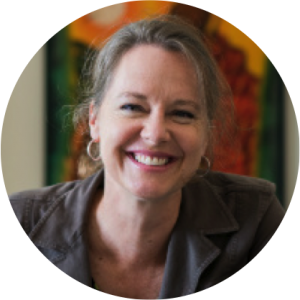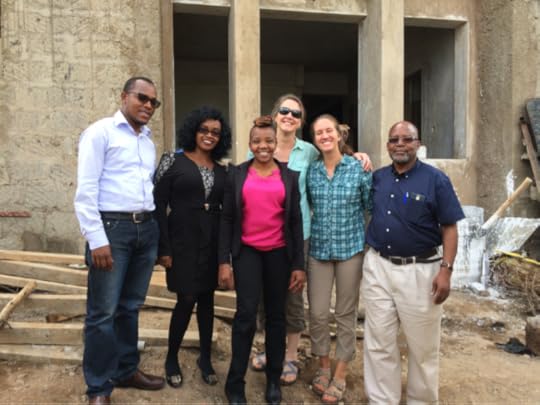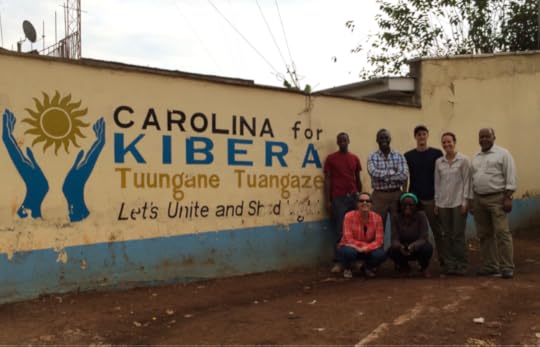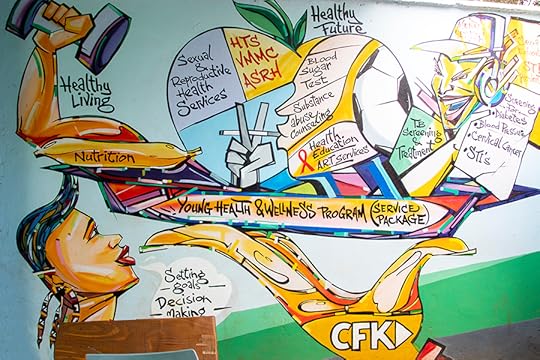Board Highlight: Creating Global Ambassadors

On one afternoon in 1999, Carolina for Kibera (CFK) co-founder Rye Barcott, then an undergraduate student at the University of North Carolina at Chapel Hill (UNC), walked into Jennifer Coffman’s office with big ambitions and a drive to make a difference. Neither of them knew that their conversation would lay the foundation for CFK a few years later.
A graduate student in anthropology at the time, Jennifer had been connected to Rye because he wanted to study ethnic violence in East Africa and take graduate-level courses during his first few semesters of undergraduate study.
“I knew he was committed or I wouldn’t have bothered with him after his freshman year,” Jennifer joked.
With experience conducting research in informal settlements, Jennifer introduced Rye to Kibera, which was recognized as one of the most rapidly expanding informal settlements in Kenya in the late 1990s. After connecting with Jennifer, Rye organized a research initiative with UNC to study youth leadership and ethnic violence in Kibera. During his research, he met Tabitha Festo, a Kiberan nurse, and Salim Mohamed, a Kenyan community organizer. Two years later, the three co-founded CFK.
Jennifer continued to conduct research in East Africa as she completed her Ph.D. in Anthropology, and, on one of her visits to Kibera in 2001, Rye introduced her to Tabitha.
The Evolution of CFK & The Importance of Humility
Jennifer has remained a part of CFK’s story for more than 19 years. She currently serves on the organization’s Board of Directors and also served three terms as Chair of the U.S. Board of Directors. Though CFK has faced challenges during its nearly two decades of service, Jennifer has watched it learn and grow into the well-respected NGO that it is today.
 May 2017 at base of Binti Center during construction.
May 2017 at base of Binti Center during construction.“Some of CFK’s most difficult times were some of the best learning experiences because the organization is focused, and it admits and learns from its mistakes,” Jennifer said. “I believe that the best monitoring and evaluation an organization can do is to document things that went poorly and share them with others. Not many organizations want to do that because they find it shameful, but that honesty is extremely refreshing and helpful, especially in research fields.”
In addition to CFK’s ability and desire to continuously improve, Jennifer believes that the organization’s leaders have been essential to keeping it grounded in integrity.
“I have never heard Rye speak [about CFK] without talking about the other co-founders,” she said. “I think that message is incredibly important, especially when thinking about collaboration between staff and board members in the U.S. and Kenya.”
Though part of the Board of Directors and involved in guiding many important decisions for the organization, Jennifer shares much of the same humility as Rye and takes little credit for the impact that CFK has achieved.
“As a board member, even if you have a great idea, it doesn’t matter if you don’t have the right people on the ground to make it work,” she said. Further, she has learned a tremendous amount from CFK staff and volunteers over the years.
CFK’s Board of Directors includes diverse American and Kenyan leaders who meet once per quarter and assist staff in Kibera by providing guidance, facilitating connections, and supporting fundraising efforts. The organization also recently convened an Advisory Council, composed of internationally recognized leaders, including 64th U.S. Secretary of State Madeleine Albright, to support CFK in addressing the challenges presented by the COVID-19 pandemic and to assist the organization in fulfilling its mission.
Creating Global Ambassadors
Jennifer now teaches at James Madison University, inspiring other young people to become global ambassadors for positive change. In addition to teaching in the U.S., she leads the East Africa Field School summer program, providing an opportunity for students to study Swahili and human-environment interactions in Kenya and Tanzania during an intensive eight-week program, which includes a visit to CFK in Kibera. Jennifer also teaches a module on CFK in one of her classes, directly connecting dozens of new students to the organization every year.
 Photo from June 2016 visit – standing from left to right: Martin Mayiani (from Lenkisem and worked with me/JMU program), Julian Rowa (former CFK ED), Hunter Hart and Rachel Palkovitz former EAFS students and program assistants, David Mshila, former CFK-Kenya board chair; kneeling from left to right: Jennifer Coffman, Judy Kiprop (Jennifer's friend and also an EAFS Kiswahili teacher)
Photo from June 2016 visit – standing from left to right: Martin Mayiani (from Lenkisem and worked with me/JMU program), Julian Rowa (former CFK ED), Hunter Hart and Rachel Palkovitz former EAFS students and program assistants, David Mshila, former CFK-Kenya board chair; kneeling from left to right: Jennifer Coffman, Judy Kiprop (Jennifer's friend and also an EAFS Kiswahili teacher) During the pandemic of 2020 and with classes moved online, Executive Director Hillary Omala presented to one of Jennifer’s classes and participated in a question and answer session with the students over Zoom. After taking Jennifer’s class and learning from Hillary this year, one student was inspired and set up a monthly donation to CFK while others led fundraisers via social media.
While many of Jennifer’s students end up donating to CFK, she doesn’t teach the module to fundraise; she teaches it because she believes in the power of passionate students and their abilities to continue to educate those in their own friend and family networks.
“Students can talk about CFK but also discuss global stories about poverty and inequality,” Jennifer said. “They are some of the best ambassadors for the program.” Likewise, donors who support scholarships for Kibera’s students open up further opportunities for Kiberan youth and educators by investing in quality formal education.
Jennifer is excited to continue supporting CFK as it enters a new decade of service in 2021. She believes that the Binti Pamoja Centre, Girls’ Empowerment Program, and sexual and reproductive health programming will continue to evolve and remain a focus of the organization, especially since high teenage pregnancy and fertility rates can exacerbate social issues and gender inequalities in Kibera.
“I’m happy that I am still part of [CFK’s] story, and I look forward to celebrating how far we have come during the organization’s 20th anniversary next year,” Jennifer said.
Learn more about the history of CFK and consider making a monthly donation to support our ongoing work.
Stories of Progress
 Board Highlight: Creating Global AmbassadorsThe Story of Jennifer Coffman On one afternoon in 1999, Carolina for Kibera (CFK) co-founder Rye Barcott, then an undergraduate student at...by Hannah Bain
Board Highlight: Creating Global AmbassadorsThe Story of Jennifer Coffman On one afternoon in 1999, Carolina for Kibera (CFK) co-founder Rye Barcott, then an undergraduate student at...by Hannah Bain
 The Power of Positive Communication During the COVID-19 PandemicThe role that positive communication strategies can play in efforts to mitigate the coronavirus. by Valerie Lucas The number of COVID-19...by Carolina for Kibera
The Power of Positive Communication During the COVID-19 PandemicThe role that positive communication strategies can play in efforts to mitigate the coronavirus. by Valerie Lucas The number of COVID-19...by Carolina for Kibera
 On the Ground: Young People Perform Vital Work on the Frontlines of COVID-19 Response in KiberaYoung people in Kibera are creative, innovative, and energetic and have devised ways to ensure continued health and education services in Kibera during the pandemic. by Carolina for Kibera
On the Ground: Young People Perform Vital Work on the Frontlines of COVID-19 Response in KiberaYoung people in Kibera are creative, innovative, and energetic and have devised ways to ensure continued health and education services in Kibera during the pandemic. by Carolina for KiberaThe post Board Highlight: Creating Global Ambassadors appeared first on Carolina for Kibera.
Rye Barcott's Blog
- Rye Barcott's profile
- 7 followers



